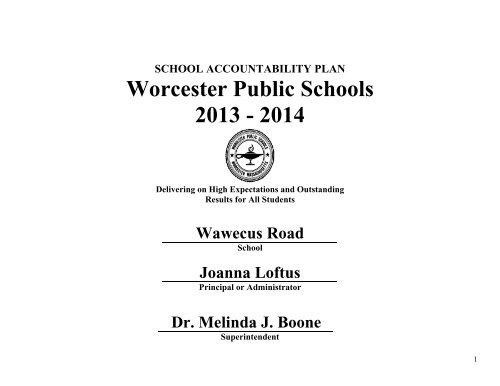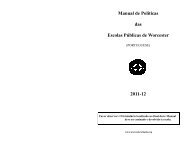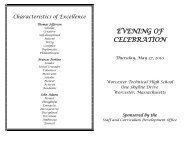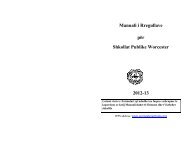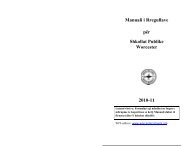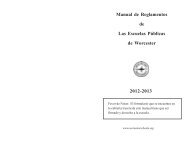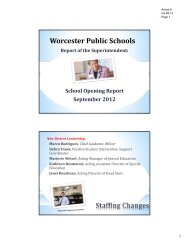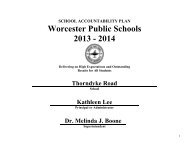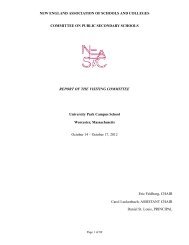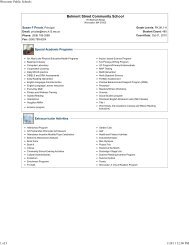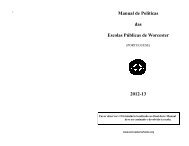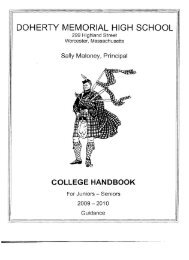Wawecus Road School - Worcester Public Schools
Wawecus Road School - Worcester Public Schools
Wawecus Road School - Worcester Public Schools
Create successful ePaper yourself
Turn your PDF publications into a flip-book with our unique Google optimized e-Paper software.
SCHOOL ACCOUNTABILITY PLAN<br />
<strong>Worcester</strong> <strong>Public</strong> <strong>School</strong>s<br />
2013 - 2014<br />
Delivering on High Expectations and Outstanding<br />
Results for All Students<br />
<strong>Wawecus</strong> <strong>Road</strong><br />
<strong>School</strong><br />
Joanna Loftus<br />
Principal or Administrator<br />
Dr. Melinda J. Boone<br />
Superintendent<br />
1
Directions for Completing the <strong>School</strong> Accountability Plan<br />
If you have any questions regarding the planning process and/or the use of the template, please contact the appropriate Quadrant Manager.<br />
I. <strong>School</strong> Instructional Leadership Team & <strong>School</strong> Site Council<br />
List the personnel and their positions<br />
List the dates (minimum of 2 per month) of the leadership team meetings for the year<br />
II. Comprehensive Needs Analysis:<br />
List specific strengths and concerns/weaknesses, supported by evidence<br />
Evidence may be qualitative or quantitative<br />
Add additional rows to the Strengths and Weaknesses sections as necessary<br />
III. Action Plan:<br />
There will be 5-6 action plan documents – one plan for each identified SMARTe goal<br />
See the table in Appendix A for the number of SMARTe goals needed for each strategic goal.<br />
See Appendix B for sample phrasings and lists of best instructional practices, resources, practices and personnel.<br />
Adult Implementation Indicators identify the adult actions that must take place to impact the identified goal<br />
See Appendix C for a sample action plan<br />
IV. Action Steps:<br />
Complete this chart for each best practice or strategy (5-6 total)<br />
Identify the action steps needed to address and implement the action plan for each of the school’s SMARTe goals<br />
There should be no more than 10 action steps per identified best practice or strategy<br />
At least one action step needs to address family engagement inclusion<br />
For each action step, identify the timeline for which this action step will be implemented or addressed<br />
For each action step, identify the person(s) responsible for implementing and reporting on its progress<br />
For each action step, identify the measures used to monitor progress of each action step<br />
For each action step, identify the resources and funding, if applicable.<br />
2
V. Professional Development Plan<br />
The professional development plan identifies activities that are needed in order to support the strategies and actions listed in the Action<br />
Steps.<br />
Review of the professional development opportunities and implementation is part of the Ongoing Evaluation process.<br />
See Section 4 of the District Accountability Framework for more detailed guidelines on professional development.<br />
See Appendix D for a sample portion of a Professional Development Plan.<br />
VI. Ongoing Evaluation – 5 Week Status Report:<br />
Status reports will be completed by the Central Office Department Leadership Team beginning on December 3 and every five weeks<br />
thereafter through the end of the school year.<br />
The purpose of the status reports is to review progress being made on the selected practices or strategies so that modifications can be<br />
made if necessary.<br />
List the 5-6 identified best practices or strategies (from your 5-6 action plans)<br />
List the Adult Implementation and Student Results Indicators<br />
Using a bulleted list of phrases or statements, reflect on the current level of implementation of the action steps.<br />
Shall the school maintain or modify this strategy If you choose to modify this strategy, include in your reflection the reasoning behind<br />
the change.<br />
VII. End of Year Reflections and Next Steps:<br />
In this section, schools describe the successes and challenges of their improvement efforts. The following questions may assist in the<br />
development of this qualitative summary:<br />
How does our performance compare to last year for every student subgroup and targeted student population<br />
How do individual student’s performance compare to their previous year’s results<br />
What are the root causes for student performance results<br />
Which strategies improved student achievement in each student subgroup and targeted student population and which ones did not<br />
Why<br />
What changes will we make to the strategies in order to improve student achievement in each student subgroup and targeted student<br />
population<br />
What are we doing to foster continuous improvement<br />
What are we learning about student learning and how does this drive our professional development<br />
As a school what do we do to meet the needs of the students who are not achieving<br />
As a school what do we do to challenge the students who have already mastered prioritized grade level skills and concepts<br />
What are our next steps for next year<br />
3
IA. <strong>School</strong> Instructional Leadership Team Members<br />
<strong>School</strong> Instructional Leadership Team (ILT) Members shall include:<br />
• Teachers (Representation of each grade level or dept/team-specify position, i.e. 2 nd grade teacher, mathematics chair, etc.)<br />
• Representatives of support populations (Special Education, English Language Learners, and other support staff)<br />
• Administration (Principal, Assistant Principal)<br />
The Instructional Leadership Team’s primary role is to help lead the school’s effort at supporting the improvement of teaching and learning. The ILT makes<br />
decisions about the school’s instructional program and leads and monitors the implementation of a sound instructional focus. This instructional focus is unique and<br />
tailored to the needs of each school.<br />
The ILT carefully monitors student performance data regarding progress toward SMARTe goals, conducts several internal audits and self assessments to help<br />
determine future action plans for the school. In order to maintain steady progress, Instructional Leadership Teams meet regularly and frequently, at least twice a<br />
month.<br />
Name Position ILT Meeting Dates<br />
Joanna Loftus Principal Sept: 13, 27<br />
Donna Anderson FIC Oct: 1, 18<br />
Diane Demoga Intermediate Teacher Nov: 15<br />
Karen Cerullo Primary Teacher Dec: 13<br />
Thea Doherty Special Education Teacher Jan:17<br />
Lori Backlin Primary Teacher Feb: 14<br />
Mar: 14<br />
Apr: 18<br />
May: 16<br />
June: 6<br />
4
IB. <strong>School</strong> Site Council Members<br />
The <strong>School</strong> Site Council meets once per month. The Site Council brings various stakeholder groups (faculty, administration, staff, students, community members)<br />
together to discuss common concerns, current status, and various other matters.<br />
Name Position Site Council Meeting Dates<br />
Joanna Loftus Principal Sept: 18<br />
Brenda Soucy Assistant Principal Oct: 9<br />
Kathleen McGovern Teacher Nov: 12<br />
Mrs. Limanni Parent Dec: TBA<br />
Mrs. Provost Parent Jan: 22<br />
Linda Granville Community Member Feb: 12<br />
Mar: 12<br />
Apr: 16<br />
May: 14<br />
June: TBA<br />
5
II. Comprehensive Needs Analysis (Good News, Urgent Statements)<br />
Complete this summary of strengths and concerns after you have completed a thorough data analysis.<br />
Strength<br />
Students increased their SGP in ELA and Math<br />
On the MCAS Students continue growth with the percent<br />
of students who received a 3 or 4 on open response in<br />
ELA.<br />
CPI<br />
ELA: On Target<br />
Math : No Change<br />
Areas of Strength<br />
Evidence<br />
<strong>Wawecus</strong> Median SGP<br />
Subgroup Subject SGP/Target<br />
All<br />
Students<br />
ELA 61.0/Above<br />
High Needs ELA 61.0/Above<br />
Low<br />
Income<br />
ELA 55.5/On<br />
All<br />
Students<br />
Math 57.5/On<br />
High Needs Math 58.0/On<br />
Low<br />
Income<br />
Math 55.5/On<br />
MCAS<br />
ELA OR 3/4<br />
Grade Percentages<br />
3 33%<br />
4 43%<br />
5 44%<br />
6 29%<br />
Total Gr 3-6 37%<br />
ELA<br />
MATH<br />
76.0 68.6<br />
On Target No change<br />
6
Students scoring A/P on MCAS has increased overall ELA -A/P Math-A/P<br />
Gr. 3 29% 19%<br />
Gr. 4 47% 20%<br />
Gr. 5 72% 38%<br />
Gr. 6 38% 31%<br />
Gr. 3-6 47% 27%<br />
*15% growth<br />
from 2012<br />
Areas of Concern<br />
Concern<br />
MATH CPI: Declined 1.5 from 2012 and must obtain 79.7<br />
in Math.<br />
DIBELS: Fall 2013<br />
BAS: Fall 2013<br />
Although the percentages have decreased, 30% in grades<br />
3-6 and 19% in K-2 are scoring 0-2 on open response in<br />
May.<br />
MAP: Although there has been growth in the strand<br />
Vocabulary/Concept Development, the Mean RIT is still<br />
low.<br />
Evidence<br />
2011 2012 2013<br />
CPI Target<br />
2013<br />
Math 75.6 70.1 68.6 79.7<br />
55% of students in K are in the red category.<br />
46% of students in grade 1 are in the red\yellow category<br />
71% of the students in grades 1 & 3 are below the grade<br />
level reading standard on the BAS.<br />
Open Response Scores<br />
Grades 3-6<br />
0 1 2 3 4<br />
May<br />
2013<br />
May<br />
2013<br />
1% 8% 21% 32% 37%<br />
Open Response Scores<br />
Grades K-2<br />
0 1 2 3 4<br />
1% 3% 15% 30% 57%<br />
Vocabulary/Concept<br />
Development<br />
Spring 2013<br />
195.5<br />
207<br />
213<br />
208<br />
Mean: 206<br />
7
III. Action Plan/Academic<br />
<strong>Worcester</strong> <strong>Public</strong> <strong>School</strong>s<br />
Strategic Goal<br />
<strong>School</strong> SMART Goal<br />
Identified Best Practice or Strategy<br />
(Include differentiation to ensure<br />
access for targeted student<br />
populations)<br />
Instructional Leadership Team<br />
Implementation<br />
(Explain how ILT members<br />
implement and measure schoolwide<br />
strategies.)<br />
<strong>Wawecus</strong> <strong>Road</strong> <strong>School</strong> will implement strategies that prepare our students to be college and career ready.<br />
<strong>Wawecus</strong>’ long term goal is to halve the proficiency gap by 2017 and demonstrate typical or higher annual<br />
student growth (i.e. median SGP of 51 or higher). Our goal for 2014 is to achieve a CPI of 83.0 in ELA,<br />
82.0 in Math, 85.4 in Science and a median of SGP of 61 or higher.<br />
On the <strong>Wawecus</strong>’ open response 100% of our students’ will increase their open response score by at least<br />
one level. The percentage of students who received a score of 3 or 4 will increase from 22% to 85% by<br />
June 2014.<br />
In Mathematics, <strong>Wawecus</strong> will increase the percentage in the column above proficiency and typical<br />
growth from 27.6% to 40% on the 2014 Spring MAP.<br />
In Science we will increase the amount of student scoring Advanced/ Proficient from 22% to 45%. On the<br />
Science open response100% of the grade five students will increase their open response score by at least<br />
one level. The percentage of students who received a score of 3 or 4 will increase from 10% to 50% by<br />
June 2014.<br />
Differentiation to ensure access for targeted student populations<br />
<strong>Wawecus</strong>’ 5 Best Practices:<br />
Post, discuss and revisit content and language objectives throughout the lesson.<br />
Demonstrate deep content knowledge throughout the presentation of the lesson<br />
Instruct using a range of techniques<br />
Pose questions that require students to engage in a process of application, analysis, synthesis and<br />
evaluation<br />
Use timely formative assessments to check for understanding to inform instruction and celebrate<br />
growth<br />
Implement a professional development that supports teachers with the understanding and use of<br />
<strong>Wawecus</strong>’ focus of comprehension and writing..<br />
Develop and implement a professional development plan to determine what <strong>Wawecus</strong>’ 5 Best Practices<br />
look like in our classrooms and to support teachers to master the practices every day, every lesson and<br />
for every child.<br />
Continue supporting school wide genre study and vocabulary initiative through professional<br />
development plan and monitor through OR questions to determine effectiveness<br />
Continue incorporating specific Teach Like a Champion techniques. The techniques support/enhance<br />
our 5 best practices.<br />
Continue planning professional development to improve teachers’ understanding of correcting and<br />
collecting student writing pieces in expository writing and the standards for mathematical practice.<br />
8
Develop and implement professional development plan to improve teachers skills set on<br />
comprehension strategies through a book study on Strategies that Work and Comprehension<br />
Connections<br />
Collect, correct and analyze student performance data<br />
Develop plans on involving parents in improving student open response, comprehension strategies and<br />
building number sense<br />
Develop and implement methods for celebrating and publicizing student achievement<br />
<strong>School</strong> Performance Indicators and Data Sources<br />
ADULT IMPLEMENTATION INDICATOR STUDENT RESULTS INDICATOR<br />
Data Source:<br />
Lesson Plans<br />
5 Week collection of school wide OR data in ELA, Math and Science<br />
DIBELS<br />
MAP<br />
BAS<br />
Observations-videos<br />
Teacher’s evidence notebooks<br />
Teacher developed informal/formal assessment<br />
Data Source:<br />
<strong>School</strong> wide open response data<br />
Writing portfolios<br />
MAP<br />
MCAS<br />
DIBELS<br />
BAS<br />
Brain Busters<br />
Teacher developed informal/formal assessments<br />
9
III. Action Steps – <strong>School</strong> SMARTe Goal Academic-ELA<br />
<strong>School</strong> SMART Goal:<br />
Best Practice or Strategy:<br />
<strong>Wawecus</strong>’ long term goal is to halve the proficiency gap by 2017 and demonstrate typical or higher annual student<br />
growth (i.e. median SGP of 51 or higher). Our goal for 2014 is to achieve a CPI of 83.0 in ELA, 82.0 in Math, 85.4<br />
in Science and a median of SGP of 61 or higher.<br />
On the <strong>Wawecus</strong>’ ELA open response 100% of our students’ will increase their open response score by at least<br />
one level. The percentage of students who received a score of 3 or 4 will increase from 22% to 85% by June<br />
2014.<br />
<strong>Wawecus</strong>’ 5 Best Practices:<br />
Post, discuss and revisit content and language objectives throughout the lesson.<br />
Demonstrate deep content knowledge throughout the presentation of the lesson<br />
Instruct using a range of techniques<br />
Pose questions that require students to engage in a process of application, analysis, synthesis and evaluation<br />
Use timely formative assessments to check for understanding to inform instruction and celebrate growth<br />
ACTION STEPS TIMELINE PERSON(S)<br />
RESPONSIBLE<br />
Professional development and implementation of<br />
Strategies that Work and Comprehension<br />
Connections specifically<br />
Questioning<br />
Inferencing/Visualization<br />
Determining Importance<br />
Teachers will share out every Monday meeting on<br />
different techniques.<br />
Teachers will receive training and implement the<br />
WPS ELA Curriculum Maps. Assessments will<br />
monitor students’ progress and fidelity to the<br />
implementation.<br />
October<br />
2013-2014<br />
October<br />
2013-2014<br />
Classroom Teacher<br />
Instructional Coach<br />
SPED Teacher<br />
Tutor<br />
ELL Tutor<br />
ILT<br />
Principal<br />
Classroom Teacher<br />
Instructional Coach<br />
SPED Teacher<br />
Tutor<br />
ELL Tutor<br />
MEASURES USED<br />
(Degree of<br />
Implementation)<br />
Open response data<br />
Lesson plans<br />
Assessments<br />
Observations<br />
Student work<br />
Teacher’s sharing out<br />
WPS ELA Curriculum<br />
Map Assessments<br />
Teacher development<br />
formal and informal<br />
assessments<br />
Teacher’s sharing out<br />
Student work<br />
RESOURCES<br />
(Including<br />
Financial)<br />
Books: Strategies<br />
that Work and<br />
Comprehension<br />
Connections<br />
WPS ELA<br />
Curriculum Maps<br />
Attending district<br />
training for<br />
Curriculum Maps<br />
10
Teachers will have students do daily skills on<br />
Open response questions<br />
correct their work<br />
give and receive feedback<br />
have dialogue with the teacher about the<br />
process<br />
Continue the school wide roll out of<br />
Fundations/Just Words<br />
Daily observations will monitor implementation<br />
of best practices: children thinking critically,<br />
teachers giving quick and effective feedback, a<br />
variety of techniques from Teach Like a<br />
Champion.<br />
Watch videos from Teach Like a Champion to<br />
review techniques.<br />
Professional development in<br />
scoring student work and developing school<br />
wide expectations for scoring the work<br />
teachers instructing students on scoring<br />
student work<br />
develop rubrics to enhance students writing<br />
October<br />
2013-June<br />
2014<br />
October<br />
2013-2014<br />
October<br />
2013-June<br />
2014<br />
October<br />
2013-June<br />
2014<br />
Classroom Teacher<br />
Instructional Coach<br />
SPED Teacher<br />
Tutor<br />
ELL Tutor<br />
ILT<br />
Principal<br />
Classroom Teacher<br />
Instructional Coach<br />
SPED Tutor<br />
Principal<br />
Instructional Coach<br />
Principal<br />
Classroom Teacher<br />
Instructional Coach<br />
SPED Teacher<br />
Tutor<br />
ELL Tutor<br />
ILT<br />
Principal<br />
Open response scores<br />
monitored by ILT<br />
Lesson Plans<br />
monitored by Principal<br />
Observations<br />
Fundations<br />
Assessments<br />
Just Words<br />
Assessments<br />
BAS<br />
Observations<br />
Open response scores<br />
Student writing<br />
portfolios<br />
Lesson Plans<br />
monitored by Principal<br />
& Coach<br />
Data collection<br />
through Observations<br />
by Principal & Coach<br />
PD plan monitored by<br />
ILT<br />
ILT meeting minutes<br />
recording PD feedback<br />
Student Work<br />
MCAS Open<br />
Response Rubric<br />
MCAS Open<br />
Response & long<br />
composition<br />
prompts<br />
MCAS Open<br />
Response<br />
exemplars<br />
ELMO<br />
Students’ work<br />
Fundations<br />
Materials<br />
Just Words<br />
Materials<br />
The WPS<br />
Framework for<br />
High Quality<br />
Teaching and<br />
Learning Pillars<br />
Standards and<br />
Indicators of<br />
Effective Teacher<br />
Practice Rubric<br />
Teach Like a<br />
Champion<br />
Teach Like a<br />
Champion video<br />
PD plan and<br />
schedule<br />
CPT<br />
Various websites<br />
Student Work<br />
11
Monitor school wide genre study and vocabulary<br />
initiative:<br />
Analyze assessments for the genres to<br />
determine if students are understanding the<br />
elements and if it is building their<br />
comprehension skills<br />
Administer weekly assessments to determine<br />
students understanding of vocabulary<br />
associated with relevant subject matter<br />
Tracking students’ progress in open response<br />
using the MCAS rubric.<br />
Professional development on understanding and<br />
implementing <strong>Wawecus</strong>’ 5 Best Practices in every<br />
lesson, every day for every student:<br />
Post, discuss and revisit content and language<br />
objectives throughout the lesson.<br />
Demonstrate deep content knowledge<br />
throughout the presentation of the lesson<br />
Instruct using a range of techniques<br />
Pose questions that require students to engage<br />
in a process of application, analysis, synthesis<br />
and evaluation<br />
Use timely formative assessments to check for u<br />
to inform instruction and celebrate growth<br />
Continue using 6 traits strategies to enhance<br />
students writing skills and to score various pieces<br />
to monitor students and the program.<br />
October<br />
2013-June<br />
2014<br />
October<br />
2013-<br />
June 2014<br />
October<br />
2013-<br />
June 2014<br />
October<br />
2013-June<br />
2014<br />
<strong>Wawecus</strong> Staff<br />
Students<br />
Classroom Teacher<br />
Instructional Coach<br />
SPED Teacher<br />
Tutor<br />
ELL Tutor<br />
ILT<br />
Principal<br />
Students<br />
Classroom Teacher<br />
Instructional Coach<br />
SPED Teacher<br />
Tutor<br />
ELL Tutor<br />
ILT<br />
Principal<br />
Classroom Teacher<br />
Instructional Coach<br />
SPED Teacher<br />
Tutor<br />
ELL Tutor<br />
ILT<br />
Principal<br />
Open response data<br />
Genre related<br />
assessments<br />
Student Work<br />
5 Week OR collection<br />
of student work<br />
Data collection<br />
through Observations<br />
by Principal & Coach<br />
Rubrics<br />
Student writing<br />
portfolios<br />
Data collection<br />
through Observations<br />
by Principal & Coach<br />
Review of 6 traits<br />
strategies<br />
Student portfolios<br />
Lesson Plans<br />
monitored by Principal<br />
& Coach<br />
Genre Map<br />
Genre materials<br />
Genre elements<br />
Scholastic News<br />
Reading A-Z<br />
Student writing<br />
portfolio<br />
Data collection<br />
sheets<br />
MCAS open<br />
response rubric<br />
Data walls<br />
Student writing<br />
portfolio<br />
Data collection<br />
sheets<br />
MCAS open<br />
response rubric<br />
Data walls<br />
FWHQT&L/Teac<br />
her Evaluation<br />
Rubric<br />
PD as needed<br />
MCAS rubric<br />
6 traits curriculum<br />
materials<br />
Writing portfolios<br />
12
Inform <strong>Wawecus</strong> families about their child’s<br />
progress.<br />
Specifically in ELA: our school’s focus of<br />
comprehension and writing<br />
Administration and Educators will implement<br />
strategies/techniques learned in ELL Endorsement<br />
Course in daily instruction.<br />
Daily Practices used to support sub groups:<br />
Differentiated instruction according to students<br />
needs, ELL levels, and IEP. Some strategies are<br />
but not limited to:<br />
grouping<br />
tier teaching model<br />
student goal setting<br />
monitor through formative assessments.<br />
Roll out the instructional practices of the Daily<br />
Five for ELA<br />
one grade at a time<br />
by teacher interest<br />
October<br />
2013-June<br />
2014<br />
October<br />
2013-2014<br />
October<br />
2013-June<br />
2014<br />
October<br />
2013-June<br />
2014<br />
Classroom Teacher<br />
Instructional Coach<br />
SPED Teacher<br />
ILT<br />
ELL Tutor<br />
Principal<br />
Classroom Teacher<br />
Instructional Coach<br />
SPED Teacher<br />
ELL Tutor<br />
Principal<br />
Student<br />
Classroom Teacher<br />
Instructional Coach<br />
SPED Teacher<br />
ILT<br />
ELL Tutor<br />
Principal<br />
Classroom teacher<br />
Coach<br />
Principal<br />
Workshop schedule<br />
Student assessment<br />
data monitored by ILT<br />
ELL Students’ Work<br />
ACCESS<br />
Formal/informal<br />
Assessments<br />
Observations<br />
Open response scores<br />
monitored by ILT<br />
Student writing<br />
portfolios monitored<br />
by ILT<br />
Lesson Plans<br />
monitored by Principal<br />
& Coach<br />
Data from<br />
Observations by<br />
Principal & Coach<br />
Lesson Plans<br />
Observations<br />
Student writing<br />
portfolios<br />
Principal<br />
Newsletter<br />
Teacher<br />
Newsletter<br />
WRS Gazette<br />
MCAS Open<br />
response<br />
exemplars<br />
DESE website<br />
ELL Endorsement<br />
Materials<br />
FWHQT&L<br />
Evaluation Rubric<br />
Book Strategies<br />
that Work<br />
FWHQT&L<br />
Student work<br />
Data<br />
<strong>School</strong> visits to<br />
successfully tier<br />
teaching models<br />
Daily Five<br />
Daily Five videos<br />
Visit schools that<br />
have successfully<br />
implemented it<br />
13
IV. Action Steps – <strong>School</strong> SMARTe Goal Acadmic - Math<br />
<strong>School</strong> SMART Goal:<br />
Best Practice or Strategy:<br />
<strong>Wawecus</strong>’ long term goal is to halve the proficiency gap by 2017 and demonstrate typical or higher annual student<br />
growth (i.e. median SGP of 51 or higher). Our goal for 2014 is to achieve a CPI of 83.0 in ELA, 82.0 in Math, 85.4<br />
in Science and a median of SGP of 61 or higher.<br />
In Mathematics, <strong>Wawecus</strong> will increase the percentage in the column above proficiency and typical growth from<br />
27.6% to 40% on the 2014 Spring MAP.<br />
<strong>Wawecus</strong>’ 5 Best Practices:<br />
Post, discuss and revisit content and language objectives throughout the lesson.<br />
Demonstrate deep content knowledge throughout the presentation of the lesson<br />
Instruct using a range of techniques<br />
Pose questions that require students to engage in a process of application, analysis, synthesis and evaluation<br />
Use timely formative assessments to check for understanding to inform instruction and celebrate growth<br />
ACTION STEPS TIMELINE PERSON(S)<br />
RESPONSIBLE<br />
MEASURES USED<br />
(Degree of<br />
Implementation)<br />
RESOURCES (Including<br />
Financial)<br />
Mathematics Professional development:<br />
build teachers content knowledge<br />
plan effective lessons<br />
develop assessments and interventions<br />
Teachers will receive training and implement<br />
the WPS Math Curriculum Maps.<br />
Assessments will monitor students’ progress<br />
and fidelity to the implementation.<br />
October<br />
2013-June<br />
2014<br />
October<br />
2013-2014<br />
Classroom Teacher<br />
Instructional Coach<br />
SPED Teacher<br />
Tutor<br />
ELL Tutor<br />
ILT<br />
Principal<br />
Classroom Teacher<br />
Instructional Coach<br />
SPED Teacher<br />
Tutor<br />
ELL Tutor<br />
Open response scores<br />
monitored by ILT<br />
Lesson Plans<br />
monitored by<br />
Principal<br />
Observations<br />
WPS ELA<br />
Curriculum Map<br />
Assessments<br />
Teacher development<br />
formal and informal<br />
assessments<br />
Teacher’s sharing out<br />
Student work<br />
Mathematical<br />
Frameworks<br />
Students’ work<br />
Resources aligned with<br />
frameworks<br />
WPS Math Curriculum<br />
Maps<br />
Attending district training<br />
for Curriculum Maps<br />
14
Teachers will have students do daily skills on<br />
writing responses,<br />
correct their work<br />
give and receive feedback<br />
have dialogue with the teacher about the<br />
process<br />
Professional development on understanding<br />
and implementing <strong>Wawecus</strong>’ 5 Best<br />
Practices in every lesson, every day for every<br />
student:<br />
Post, discuss and revisit content and<br />
language objectives throughout the<br />
lesson.<br />
Demonstrate deep content knowledge<br />
throughout the presentation of the lesson<br />
Instruct using a range of techniques<br />
Pose questions that require students to<br />
engage in a process of application,<br />
analysis, synthesis and evaluation<br />
Use timely formative assessments to<br />
check for understanding to inform<br />
instruction and celebrate growth<br />
Daily observations will monitor<br />
implementation of best practices: children<br />
thinking critically, teachers giving quick and<br />
effective feedback, a variety of techniques<br />
from Teach Like a Champion.<br />
Watch videos from Teach Like a Champion<br />
to review techniques.<br />
October<br />
2013-June<br />
2014<br />
October<br />
2013-June<br />
2014<br />
October<br />
2013-June<br />
2014<br />
Classroom Teacher<br />
Instructional Coach<br />
SPED Teacher<br />
Tutor<br />
ELL Tutor<br />
ILT<br />
Principal<br />
Students<br />
Classroom Teacher<br />
Instructional Coach<br />
SPED Teacher<br />
Tutor<br />
ELL Tutor<br />
ILT<br />
Principal<br />
Instructional Coach<br />
Principal<br />
Open response scores<br />
monitored by ILT<br />
Student writing<br />
portfolios monitored<br />
by ILT<br />
Lesson Plans<br />
monitored by<br />
Principal<br />
Observations<br />
Student writing<br />
portfolios<br />
Data collection<br />
through Observations<br />
by Principal &<br />
Coach<br />
Open response scores<br />
Student writing<br />
portfolios<br />
Lesson Plans<br />
monitored by<br />
Principal & Coach<br />
Data collection<br />
through Observations<br />
by Principal &<br />
Coach<br />
MCAS Open Response<br />
Rubric<br />
MCAS Open Response<br />
exemplars<br />
Smart Board<br />
ELMO<br />
Student writing portfolios<br />
Students’ work<br />
Student writing portfolio<br />
Data collection sheets<br />
MCAS open response<br />
rubric<br />
Data walls<br />
FWHQT&L/Teacher<br />
Evaluation Rubric<br />
PD as needed<br />
The WPS Framework for<br />
High Quality Teaching<br />
and Learning Pillars<br />
Standards and Indicators<br />
of Effective Teacher<br />
Practice Rubric<br />
Teach Like a Champion<br />
15
Professional development in<br />
scoring student work and developing<br />
school wide expectations for scoring the<br />
work<br />
teachers instructing students on scoring<br />
student work<br />
Tracking students’ progress in open response<br />
using the MCAS rubric. Teacher will<br />
implement the ACE process for answering<br />
open response in math.<br />
Daily instructional practices teachers will<br />
use:<br />
Engage student through instructional<br />
practices:<br />
modeling skills,<br />
whole group and peer discussions,<br />
scoring work, and using effective<br />
feedback<br />
Administration and Educators will<br />
implement strategies/techniques learned in<br />
ELL Endorsement Course in daily<br />
instruction.<br />
Inform <strong>Wawecus</strong> families about their child’s<br />
progress:<br />
Specifically in Math: our school’s focus<br />
of Number and Operations in Base Ten<br />
and Number Systems<br />
Implement First in Math Program<br />
October<br />
2013-June<br />
2014<br />
October<br />
2013-<br />
June 2014<br />
October<br />
2013-<br />
June 2014<br />
October<br />
2013-2014<br />
October<br />
2013-June<br />
2014<br />
November<br />
2013-2014<br />
Classroom Teacher<br />
Instructional Coach<br />
SPED Teacher<br />
Tutor<br />
ELL Tutor<br />
ILT<br />
Principal<br />
Students<br />
Classroom Teacher<br />
Instructional Coach<br />
SPED Teacher<br />
Tutor<br />
ELL Tutor<br />
ILT<br />
Principal<br />
Students<br />
Classroom Teacher<br />
Instructional Coach<br />
SPED Teacher<br />
Tutor<br />
ELL Tutor<br />
ILT<br />
Principal<br />
Classroom Teacher<br />
Instructional Coach<br />
SPED Teacher<br />
ELL Tutor<br />
Principal<br />
Classroom Teacher<br />
Instructional Coach<br />
SPED Teacher<br />
ILT<br />
ELL Tutor<br />
Principal<br />
Classroom Teacher<br />
Instructional Coach<br />
PD plan monitored<br />
by ILT<br />
ILT meeting minutes<br />
recording PD<br />
feedback<br />
Student Work<br />
Student writing<br />
portfolios<br />
Data collection<br />
through Observations<br />
by Principal &<br />
Coach<br />
Student writing<br />
portfolios<br />
Data collection<br />
through Observations<br />
by Principal &<br />
Coach<br />
ELL Students’ Work<br />
ACCESS<br />
Formal/informal<br />
Assessments<br />
Observations<br />
Workshop schedule<br />
Student assessment<br />
data monitored by<br />
ILT<br />
First Math<br />
Assessments<br />
Math Assessments<br />
PD plan and schedule<br />
CPT<br />
Various websites<br />
Student writing<br />
portfolio<br />
Data collection sheets<br />
MCAS open response<br />
rubric<br />
Data walls<br />
Student writing portfolio<br />
Data collection sheets<br />
MCAS open response<br />
rubric<br />
Data walls<br />
ELL Endorsement<br />
Materials<br />
FWHQT&L<br />
Evaluation Rubric<br />
Principal Newsletter<br />
Teacher Newsletter<br />
MCAS Open response<br />
exemplars<br />
DESE website<br />
Connect Ed Messages<br />
First Math Program<br />
16
Daily Practices used to support sub groups:<br />
Differentiated instruction according to<br />
students needs, ELL levels, and IEP. Some<br />
strategies are but not limited to:<br />
grouping<br />
tier teaching model<br />
student goal setting<br />
monitor through formative assessments<br />
Roll out the instructional practices of the<br />
Daily Five for Math<br />
one grade at a time<br />
by teacher interest<br />
October<br />
2013-June<br />
2014<br />
October<br />
2013-June<br />
2014<br />
Student<br />
Classroom Teacher<br />
Instructional Coach<br />
SPED Tutor<br />
ILT<br />
ELL Tutor<br />
Principal<br />
Classroom teacher<br />
Coach<br />
Principal<br />
Open response scores<br />
monitored by ILT<br />
Student writing<br />
portfolios monitored<br />
by ILT<br />
Lesson Plans<br />
monitored by<br />
Principal & Coach<br />
Data from<br />
Observations by<br />
Principal & Coach<br />
Lesson Plans<br />
Observations<br />
Math Open response<br />
Book Strategies that<br />
Work<br />
The WPS Framework for<br />
High Quality Teaching<br />
and Learning Pillars<br />
Student work<br />
Data<br />
<strong>School</strong> visits to<br />
successfully tier teaching<br />
models<br />
Daily Five<br />
Visit schools that have<br />
successfully implemented<br />
it<br />
17
IV. Action Steps – <strong>School</strong> SMARTe Goal Academic – Science<br />
<strong>School</strong> SMART Goal:<br />
Best Practice or Strategy:<br />
<strong>Wawecus</strong>’ long term goal is to halve the proficiency gap by 2017 and demonstrate typical or higher annual student<br />
growth (i.e. median SGP of 51 or higher). Our goal for 2014 is to achieve a CPI of 83.0 in ELA, 82.0 in Math, 85.4<br />
in Science and a median of SGP of 61 or higher.<br />
In Science we will increase the amount of student scoring Advanced/ Proficient from 22% to 45%. On the Science<br />
open response100% of the grade five students will increase their open response score by at least one level. The<br />
percentage of students who received a score of 3 or 4 will increase from 10% to 50% by June 2014.<br />
<strong>Wawecus</strong>’ 5 Best Practices:<br />
Post, discuss and revisit content and language objectives throughout the lesson.<br />
Demonstrate deep content knowledge throughout the presentation of the lesson<br />
Instruct using a range of techniques<br />
Pose questions that require students to engage in a process of application, analysis, synthesis and evaluation<br />
Use timely formative assessments to check for understanding to inform instruction and celebrate growth<br />
ACTION STEPS TIMELINE<br />
Professional development and implementation<br />
of Strategies that Work and Comprehension<br />
Connections specifically<br />
Questioning<br />
Inferencing/Visualization<br />
Determining Importance<br />
Teachers will share out every Monday<br />
meeting on different techniques.<br />
Daily skills teachers will have students do<br />
Open response questions<br />
correct their work<br />
give and receive feedback<br />
have dialogue with the teacher about the<br />
process<br />
October<br />
2013-<br />
2014<br />
October<br />
2013-<br />
June<br />
2014<br />
PERSON(S)<br />
RESPONSIBLE<br />
Classroom Teacher<br />
Instructional Coach<br />
SPED Teacher<br />
Tutor<br />
ELL Tutor<br />
ILT<br />
Principal<br />
Classroom Teacher<br />
Instructional Coach<br />
SPED Teacher<br />
Tutor<br />
ELL Tutor<br />
ILT<br />
Principal<br />
MEASURES USED<br />
(Degree of<br />
Implementation)<br />
Open response data<br />
Lesson plans<br />
Assessments<br />
Observations<br />
Student work<br />
Teacher’s sharing out<br />
Open response scores<br />
monitored by ILT<br />
Lesson Plans monitored<br />
by Principal<br />
Observations<br />
RESOURCES<br />
(Including Financial)<br />
Books: Strategies that<br />
Work and<br />
Comprehension<br />
Connections<br />
MCAS Open<br />
Response Rubric<br />
MCAS Open<br />
Response exemplars<br />
ELMO<br />
Students’ work<br />
18
Daily observations will monitor<br />
implementation of best practices: children<br />
thinking critically, teachers giving quick and<br />
effective feedback, a variety of techniques<br />
from Teach Like a Champion.<br />
Watch videos from Teach Like a Champion to<br />
review techniques.<br />
Professional development in<br />
scoring student work and developing<br />
school wide expectations for scoring the<br />
work<br />
teachers instructing students on scoring<br />
student work<br />
developing rubrics<br />
Monitor school wide genre and vocabulary<br />
initiative study:<br />
Analyze assessments for the genres to<br />
determine if students are understanding<br />
the elements and if it is building their<br />
comprehension skills-specifically<br />
Informational Text for Science.<br />
Administering assessments to monitor<br />
students understanding of vocabulary in<br />
Science<br />
Tracking students’ progress in open response<br />
using the MCAS rubric.<br />
October<br />
2013-<br />
June<br />
2014<br />
October<br />
2013-<br />
June<br />
2014<br />
October<br />
2013-<br />
June<br />
2014<br />
October<br />
2013-<br />
June<br />
2014<br />
Instructional Coach<br />
Principal<br />
Classroom Teacher<br />
Instructional Coach<br />
SPED Teacher<br />
Tutor<br />
ELL Tutor<br />
ILT<br />
Principal<br />
<strong>Wawecus</strong> Staff<br />
Students<br />
Classroom Teacher<br />
Instructional Coach<br />
SPED Teacher<br />
Tutor<br />
ELL Tutor<br />
ILT<br />
Principal<br />
Open response scores<br />
Student writing<br />
portfolios<br />
Lesson Plans monitored<br />
by Principal & Coach<br />
Data collection through<br />
Observations by<br />
Principal & Coach<br />
PD plan monitored by<br />
ILT<br />
ILT meeting minutes<br />
recording PD feedback<br />
Student Work<br />
Open response data<br />
Genre related<br />
assessments<br />
Student Work<br />
5 Week OR collection<br />
of student work<br />
Data collection through<br />
Observations by<br />
Principal & Coach<br />
Rubrics<br />
The WPS Framework<br />
for High Quality<br />
Teaching and<br />
Learning Pillars<br />
Standards and<br />
Indicators of<br />
Effective Teacher<br />
Practice Rubric<br />
Teach Like a<br />
Champion<br />
Teach Like a<br />
Champion video<br />
PD plan and schedule<br />
CPT<br />
Various websites<br />
Student Work<br />
Genre Map<br />
Genre materials<br />
Genre elements<br />
Scholatic News<br />
Discovery Ed<br />
Moodle<br />
Student writing<br />
portfolio<br />
Data collection<br />
sheets<br />
MCAS open response<br />
rubric<br />
Data walls<br />
19
Professional development on understanding<br />
and implementing <strong>Wawecus</strong>’ 5 Best Practices<br />
in every lesson, every day, for every child:<br />
Post, discuss and revisit content and<br />
language objectives throughout the lesson.<br />
Demonstrate deep content knowledge<br />
throughout the presentation of the lesson<br />
Instruct using a range of techniques<br />
Pose questions that require students to<br />
engage in a process of application,<br />
analysis, synthesis and evaluation<br />
Use timely formative assessments to check f<br />
understanding to inform instruction and cele<br />
Inform <strong>Wawecus</strong> families about their child’s<br />
progress.<br />
Specifically in Science: our school’s<br />
focus of comprehension and writing<br />
Administration and Educators will implement<br />
strategies/techniques learned in ELL<br />
Endorsement Course in daily instruction.<br />
Continue incorporating Science PD on<br />
Integrating Science into daily instruction<br />
Using Science level readers to provide<br />
students with Science content at their<br />
reading level<br />
Discovery Ed and using it efficiently and<br />
effectively<br />
Collecting Science open response, LASW<br />
and developing rubrics<br />
October<br />
2013-<br />
June<br />
2014<br />
October<br />
2013-<br />
June<br />
2014<br />
October<br />
2013-<br />
2014<br />
October<br />
2013-<br />
June<br />
2014<br />
Students<br />
Classroom Teacher<br />
Instructional Coach<br />
SPED Teacher<br />
Tutor<br />
ELL Tutor<br />
ILT<br />
Principal<br />
Classroom Teacher<br />
Instructional Coach<br />
SPED Teacher<br />
ILT<br />
ELL Tutor<br />
Principal<br />
Classroom Teacher<br />
Instructional Coach<br />
SPED Teacher<br />
ELL Tutor<br />
Principal<br />
Student<br />
Classroom Teacher<br />
Instructional Coach<br />
SPED Teacher<br />
ILT<br />
ELL Tutor<br />
Principal<br />
Student writing<br />
portfolios<br />
Data collection through<br />
Observations by<br />
Principal & Coach<br />
Workshop schedule<br />
Student assessment data<br />
monitored by ILT<br />
ELL Students’ Work<br />
ACCESS<br />
Formal/informal<br />
Assessments<br />
Observations<br />
Open response scores<br />
monitored by ILT<br />
Student writing<br />
portfolios monitored by<br />
ILT<br />
Lesson Plans monitored<br />
by Principal & Coach<br />
Data from Observations<br />
by Principal & Coach<br />
Student writing<br />
portfolio<br />
Data collection<br />
sheets<br />
MCAS open response<br />
rubric<br />
Data walls<br />
FWHQT&L/Teacher<br />
Evaluation Rubric<br />
PD as needed<br />
Principal Newsletter<br />
Teacher Newsletter<br />
WRS Gazette<br />
MCAS Open<br />
response exemplars<br />
DESE website<br />
ELL Endorsement<br />
Materials<br />
FWHQT&L<br />
Evaluation Rubric<br />
Book Strategies that<br />
Work<br />
FWHQT&L<br />
Student work<br />
Data<br />
<strong>School</strong> visits to<br />
successfully tier<br />
teaching models<br />
Discovery Ed<br />
20
<strong>Worcester</strong> <strong>Public</strong> <strong>School</strong>s<br />
Strategic Goal<br />
<strong>School</strong> SMART Goal<br />
Identified Best Practice or Strategy<br />
(Include differentiation to ensure<br />
access for targeted student<br />
populations)<br />
Instructional Leadership Team<br />
Implementation<br />
(Explain how ILT members<br />
implement and measure schoolwide<br />
strategies.)<br />
IV. Action Plan\Safe <strong>School</strong>s<br />
<strong>Wawecus</strong> <strong>Road</strong> <strong>School</strong> will develop and maintain a welcoming, safe, secure school<br />
100% of the students <strong>Wawecus</strong> <strong>Road</strong> students will be provided with a welcoming, safe, and secure<br />
environment to be developed in a positive manner. We will decrease suspensions from 25% to 20% and<br />
increase the number of students attending PBIS celebrations from 90% to 100% for 3 out of the 4 quarters.<br />
Differentiation to ensure access for targeted student populations<br />
Maintain an atmosphere aligned with PBIS guidelines and free from bullying.<br />
SSP’s to determine needs and provide supports for at risk students<br />
Mentors for at risk students<br />
SAC consults for at risk students and parent support<br />
PBIS committee will meet frequently to support the schools PBIS initiative<br />
Monitor student assessment data for progress<br />
Monitor teacher referral forms<br />
<strong>School</strong> Performance Indicators and Data Sources<br />
ADULT IMPLEMENTATION INDICATOR STUDENT RESULTS INDICATOR<br />
Periodic review of data samples to identify trends in progress, academically<br />
and behaviorally<br />
Participation in meetings aimed to provide support and interventions<br />
Increased focus on learning and in students making positive<br />
choices that result in safe, respectful, and responsible behavior<br />
Data Source:<br />
Teacher referral forms<br />
PBIS meeting documentation<br />
Periodic review of individual student scores to monitor students<br />
Steps to Respect/Second Step Schedules<br />
SSP documentation<br />
Attendance, tardy and dismissal records<br />
Data Source:<br />
Teacher referral forms<br />
PBIS attendance data<br />
21
IV. Action Steps – <strong>School</strong> SMARTe Goal Safe <strong>School</strong>s<br />
<strong>School</strong> SMART Goal:<br />
Best Practice or Strategy:<br />
100% of the students <strong>Wawecus</strong> <strong>Road</strong> students will be provided with a welcoming, safe, and secure environment<br />
to be developed in a positive manner. We will decrease suspensions from 25% to 20% and increase the number<br />
of students attending PBIS celebrations from 90% to 100% for 3 out of the 4 quarters.<br />
Maintain an atmosphere aligned with PBIS guidelines and free from bullying.<br />
ACTION STEPS TIMELINE PERSON(S)<br />
RESPONSIBLE<br />
MEASURES USED<br />
(Degree of<br />
Implementation)<br />
RESOURCES (Including<br />
Financial)<br />
Identify and support at risk students<br />
Provide instruction in defining<br />
bullying and strategies to prevent it<br />
ISafe lessons<br />
Provide information to parents<br />
regarding bullying and strategies that<br />
prevent it<br />
September<br />
2013-<br />
June 2014<br />
September<br />
2013-<br />
June 2014<br />
September<br />
2013-<br />
June 2014<br />
Classroom Teacher<br />
Instructional Coach<br />
SAC<br />
Principal<br />
Parents<br />
Classroom Teacher<br />
Instructional Coach<br />
SPED Teacher<br />
ELL Teacher<br />
ILT<br />
SAC<br />
Principal<br />
Classroom Teacher<br />
Instructional Coach<br />
Health Teacher<br />
Principal<br />
ILT monitors<br />
assessment data for at<br />
risk students<br />
ILT monitors teacher<br />
referral forms<br />
Principal monitors<br />
SSP documents<br />
SAC monitors tardy,<br />
dismissal, and<br />
attendance data<br />
Principal and coach<br />
maintain record of<br />
assemblies and WPS<br />
Health instruction<br />
schedule<br />
Principal and Coach<br />
monitor newsletter<br />
and <strong>Wawecus</strong> website<br />
Student assessment data<br />
Mentors<br />
Attendance/tardy/dismissal<br />
data<br />
Teacher referral forms<br />
SSP meeting time<br />
WPS Health/Anti-Bullying<br />
curriculum<br />
Copies of Mass Anti-Bullying<br />
law<br />
Steps to Respect/Second Step<br />
WPS Police Liaison<br />
WPS Safety Liaison<br />
Anti-bullying material<br />
<strong>Wawecus</strong> website<br />
Principal’s newsletter<br />
WPS Police Liaison<br />
WPS Safety Liaison<br />
Anti-bullying material<br />
22
Support positive choices and provide<br />
positive and constructive<br />
consequences as appropriate<br />
September<br />
2013-<br />
June 2014<br />
Classroom Teacher<br />
Instructional Coach<br />
SAC<br />
Principal<br />
Principal and Coach<br />
will support PBIS<br />
committee to schedule<br />
celebrations<br />
SAC maintains<br />
schedule for Second<br />
Step/Steps to Respect<br />
Assembly time<br />
Wally cards<br />
Good choice celebration time<br />
Green reward cards<br />
Pink discipline cards<br />
Teacher referral forms<br />
Steps to Respect/Second Step<br />
23
<strong>Worcester</strong> <strong>Public</strong> <strong>School</strong>s<br />
Strategic Goal<br />
<strong>School</strong> SMART Goal<br />
Identified Best Practice or Strategy<br />
(Include differentiation to ensure<br />
access for targeted student<br />
populations)<br />
Instructional Leadership Team<br />
Implementation<br />
(Explain how ILT members<br />
implement and measure schoolwide<br />
strategies.)<br />
IV. Action Plan\Family and Community<br />
<strong>Wawecus</strong> <strong>Road</strong> <strong>School</strong> will foster high levels of family and community engagement, commitment and<br />
partnership.<br />
<strong>Wawecus</strong> <strong>Road</strong> will increase opportunities for engagement of families and community members in<br />
supporting students’ achievement from 25% to 50% by June 2014.<br />
Differentiation to ensure access for targeted student populations<br />
Involve parents in student success via parent workshops, provision of academic support strategies and<br />
curriculum materials.<br />
Multilingual Connect Ed messages<br />
Translations provided upon request<br />
Interpreters for parent/teacher conferences upon request<br />
Interpreter for PTO and <strong>School</strong> Council meetings upon request<br />
Connect SAC to families in need of support<br />
Plan and develop framework for workshops<br />
Develop PTO and <strong>School</strong> Council agendas with input from parents, community members, and staff<br />
Selected ILT members participate in PTO and <strong>School</strong> Council<br />
<strong>School</strong> Performance Indicators and Data Sources<br />
ADULT IMPLEMENTATION INDICATOR STUDENT RESULTS INDICATOR<br />
Periodic review of data samples<br />
Provision of assessment data to parents and community<br />
Data Source:<br />
Attendance records for PTO meetings<br />
Attendance records for workshops<br />
Student attendance and tardy records<br />
Copies of newsletters<br />
WPS websites<br />
Increased focus on learning and in students making positive<br />
choices that result in safe, respectful, and responsible<br />
behavior<br />
Data Source:<br />
Attendance data for various family events<br />
Home to <strong>School</strong> communication data<br />
24
IV. Action Steps – <strong>School</strong> SMARTe Goal Family and Community<br />
<strong>School</strong> SMART Goal:<br />
Best Practice or Strategy:<br />
<strong>Wawecus</strong> <strong>Road</strong> will increase opportunities for engagement of families and community members in supporting<br />
students’ achievement from 25% to 50% by June 2014.<br />
Include data reports, dates and data information sessions in the Principal’s Newsletter as well as in the Wednesday<br />
communicators.<br />
ACTION STEPS TIMELINE PERSON(S)<br />
RESPONSIBLE<br />
Use of Principal’s Newsletter to disseminate data<br />
awareness, information and explanation.<br />
Use of monthly calendar to communicate dates and<br />
meeting times.<br />
Use of Connect-Ed-<strong>Wawecus</strong> Weekly Update to involve<br />
and invite parents to events and data information sessions.<br />
Use of Wednesday communicator to reinforce event and<br />
meeting information.<br />
Continue to provide opportunities for families to engage<br />
With our staff and students with our best practices through<br />
Family workshops provided by staff members based on our<br />
Best practices and student community needs.<br />
Family Showcase: Teachers have students showcase<br />
a specific standard by inviting families to participate<br />
in a lesson. They also observe their children sharing their<br />
knowledge on a related subject to the standard.<br />
October<br />
2013-June<br />
2014<br />
October<br />
2013-June<br />
2014<br />
October<br />
2013-June<br />
2014<br />
October<br />
2013-June<br />
2014<br />
October<br />
2013-June<br />
2014<br />
Winter/Spring<br />
2014<br />
Principal<br />
Staff<br />
Principal<br />
Staff<br />
Principal<br />
Staff<br />
Principal<br />
Staff<br />
Principal<br />
Staff<br />
SAC<br />
MEASURES<br />
USED (Degree of<br />
Implementation)<br />
Participation<br />
Participation<br />
Participation<br />
Participation<br />
Participation<br />
RESOURCES<br />
(Including Financial)<br />
Newsletters<br />
Flyers<br />
Calendars<br />
(translations)<br />
Blackboard<br />
Connect<br />
Technology<br />
Flyers<br />
Principal<br />
Staff<br />
SAC<br />
Teachers Participation MA Frameworks<br />
25
IV. Action Plan\Communication<br />
<strong>Worcester</strong> <strong>Public</strong> <strong>School</strong>s<br />
Strategic Goal<br />
<strong>School</strong> SMART Goal<br />
Identified Best practice or<br />
Strategy<br />
(Include differentiation to ensure<br />
access for targeted student<br />
populations)<br />
Instructional Leadership Team<br />
Implementation<br />
(Explain how ILT members<br />
implement and measure schoolwide<br />
strategies.)<br />
The WPS will develop a formal communication system in order to better transfer information of effective<br />
practices and needs.<br />
One hundred percent of our families will receive communication updates quarterly. Updates will focus on<br />
best practices. <strong>Wawecus</strong> educators will increase the amount of two-way communication channels with<br />
<strong>Wawecus</strong> families from 20% to 60% by June 2014.<br />
All family communication will include our school focus in various languages to reinforce the school focus<br />
and our commitment to it. As data becomes available, it will be disseminated and posted.<br />
Differentiation to ensure access for targeted student populations<br />
Document translations as needed, if available<br />
Translators available for meetings<br />
A column in the Principal’s Newsletter each month will be dedicated to the school focus and best practices.<br />
<strong>School</strong> Performance Indicators and Data Sources<br />
ADULT IMPLEMENTATION INDICATOR<br />
Maintain consistency with even frequency in communication updates<br />
Data Source:<br />
Principal’s newsletter<br />
KYSN<br />
Student data<br />
Parent Surveys<br />
MCAS night<br />
Wednesday Communicator to Staff, students and families<br />
Staff Newletters<br />
Wednesday Communicator to Staff, students and families<br />
Staff Newsletters<br />
Agendas<br />
STUDENT RESULTS INDICATOR<br />
Students can verbalize the school focus and explain its<br />
importance to their academic goals<br />
Data Source:<br />
Student goal setting sheets<br />
Student plotting of personal data (MAP Dibels, Fountas and<br />
Pinnell)<br />
Students present information to classrooms and families on<br />
MCAS night<br />
Agendas<br />
26
<strong>School</strong> SMARTe Goal:<br />
IV. Action Steps – <strong>School</strong> SMARTe Goal Communication<br />
One hundred percent of our families will receive communication updates quarterly. Updates will focus on best<br />
practices. <strong>Wawecus</strong> educators will increase the amount of two-way communication channels with <strong>Wawecus</strong> families<br />
from 20% to 60% by June 2014.<br />
Best Practice or Strategy:<br />
All family communication will include our school focus in various languages to reinforce the school focus and our<br />
commitment to it. As data becomes available, it will be disseminated and posted.<br />
ACTION STEPS TIMELINE PERSON(S)<br />
RESPONSIBLE<br />
MEASURES<br />
USED (Degree of<br />
Implementation)<br />
RESOURCES (Including<br />
Financial)<br />
Monthly newsletters will<br />
communicate assessment information<br />
Face to face conferencing will be<br />
held on individual student progress<br />
to discuss their assessment data and<br />
strategies to support their writing<br />
success and understanding what they<br />
are reading<br />
Celebrate student achievement in<br />
understanding what they’ve read<br />
sharing it through writing.<br />
Connect Ed messages used to<br />
communicate dates and information<br />
on conferences and events<br />
Translations, multilingual Connect<br />
Ed messages, and interpreters will be<br />
utilized as necessary and when<br />
appropriate<br />
End of the first term: All teachers<br />
will have a conference with parents<br />
to discuss the report card and<br />
students’ progress<br />
September 2013-<br />
June 2014<br />
September 2013-<br />
June 2014<br />
September 2013-<br />
June 2014<br />
September 2013-<br />
June 2014<br />
September 2013-<br />
June 2014<br />
November 2013<br />
Classroom Teacher<br />
Instructional Coach<br />
Principal<br />
Classroom Teacher<br />
Instructional Coach<br />
ILT<br />
Principal<br />
Classroom Teacher<br />
Instructional Coach<br />
ILT<br />
Principal<br />
Principal<br />
AP<br />
Principal<br />
AP<br />
Teachers<br />
Principal<br />
Principal and<br />
Coach monitor<br />
newsletter content<br />
Attendance records<br />
PTO meeting<br />
agenda<br />
ILT monitors<br />
content of<br />
newsletter for<br />
celebrations<br />
Copies of Gazette<br />
Connect Ed<br />
records<br />
Connect Ed<br />
records<br />
Copies of<br />
newsletters<br />
Interpreter request<br />
documentation<br />
Collection of<br />
attendance for<br />
conferences<br />
Classroom newsletter<br />
Principal newsletter<br />
WRS Gazette<br />
Assessment data<br />
Agenda<br />
Meeting time<br />
Connect ED<br />
WRS Gazette<br />
Monthly writing awards<br />
Connect Ed System<br />
Connect Ed System<br />
ESL Department<br />
WPS Website<br />
Student data<br />
27
Administration and teachers will give<br />
parents at least two surveys to<br />
establish two way communication<br />
SAC will run monthly attendance<br />
meetings for students who are<br />
chronically tardy, absent or both<br />
Attendance breakfasts will be given<br />
to families who have outstanding<br />
attendance for the school year<br />
October 2013-June<br />
2014<br />
Monthly from<br />
October 2013-June<br />
2014<br />
Teachers<br />
Principal<br />
Instructional Coach<br />
Principal<br />
SAC<br />
Teachers<br />
Data on returns of<br />
surveys<br />
Content in surveys<br />
Attendance data<br />
Surveys<br />
Training on how to write effective<br />
surveys<br />
Attendance data past and present<br />
June 2014 All <strong>Wawecus</strong> Staff Attendance records Attendance records<br />
28
<strong>Worcester</strong> <strong>Public</strong> <strong>School</strong>s<br />
Targeted Professional Development Plan<br />
2013- 2014<br />
A Targeted Professional Development Plan includes professional development that<br />
builds expertise, changes instructional practice, monitors student performance and is<br />
regularly communicated.<br />
29
<strong>Worcester</strong> <strong>Public</strong> <strong>School</strong>s<br />
Targeted Professional Development Plan<br />
<strong>School</strong> Name:<br />
<strong>Wawecus</strong> <strong>Road</strong><br />
SCHOOL FOCUS: SCHOOL FOCUS: <strong>Wawecus</strong> <strong>Road</strong> <strong>School</strong> will participate in a school-wide coordinated effort to prepare our students to be<br />
college and career ready. Students will demonstrate through reading, writing and speaking measurable growth in their ability to read fluently,<br />
comprehend deeply, think critically and respond effectively. This will be achieved by relentlessly implementing our 5 best practices, continuing<br />
the 6 Traits writing model with fidelity, developing rubrics and correcting student work. Students’ progress will be frequently measured by<br />
rubrics, formative and summative assessments, and the teacher’s collection of portfolio artifacts.<br />
Best Practice:<br />
Best Practice:<br />
Best Practice:<br />
Post, discuss and revisit content and<br />
language objectives throughout the lesson.<br />
Demonstrate deep content knowledge<br />
throughout the presentation of the lesson<br />
Instruct using a range of techniques<br />
Use timely formative assessments to check<br />
for understanding to inform instruction and<br />
celebrate growth.<br />
Pose questions that require students to<br />
engage in a process of application,<br />
analysis, synthesis and evaluation<br />
Directions: For each month, list the professional development activities that will be given at your school.<br />
The professional development could take place in various session formats, including but not limited to faculty meetings, grade level<br />
meetings/common planning team meetings/department meetings, and the contractual 8 hours around your best practices that will support<br />
your school focus. Indicate which of the district strategic goals are addressed in this professional development session.<br />
30
Month Date #<br />
Minute<br />
s<br />
Topic<br />
9 60 Genre Study Check in<br />
MCAS Data analysis to<br />
determine:<br />
Strengths & high priority<br />
areas<br />
SAP: Next steps<br />
13 90 ILT: analyze and prep MCAS<br />
data to share with staff<br />
Session<br />
Format<br />
Staff<br />
Meeting<br />
SMART<br />
Goal #<br />
1, 3<br />
ILT 1, 2, 3<br />
Builds<br />
Expert<br />
ise<br />
Changes<br />
Instructional<br />
Practice<br />
Check All Applicable Boxes<br />
Monitoring<br />
Student<br />
Performance<br />
Communicating<br />
Relentlessly<br />
District Support<br />
Needed<br />
September<br />
27 60 ILT: Organize and distribute<br />
information gathered at prior<br />
meeting. Beginning planning<br />
for SAP next steps<br />
ILT 1, 2, 3<br />
24/25 90 Review strategies in Teach<br />
Like a Champion and align<br />
them with 5 best practices<br />
and the school focus.<br />
CPT 1, 2, 3<br />
31
Month Date # Minutes Topic Session<br />
Format<br />
1 60 ILT: Prep for October 5 th<br />
PD day: Determine focus<br />
areas<br />
SMART<br />
Goal #<br />
ILT 1, 2, 3<br />
Builds<br />
Expertise<br />
Changes<br />
Instructional<br />
Practice<br />
Check All Applicable Boxes<br />
Monitoring<br />
Student<br />
Performance<br />
Communicating<br />
Relentlessly<br />
District<br />
Support<br />
Needed<br />
October<br />
11 6 hours PD Day:<br />
Professional development on<br />
understanding and<br />
implementing <strong>Wawecus</strong>’ 5<br />
Best Practices in every lesson,<br />
every day, for every child:<br />
Post, discuss and revisit<br />
content and language<br />
objectives throughout the<br />
lesson.<br />
Demonstrate deep content<br />
knowledge throughout the<br />
presentation of the lesson<br />
Instruct using a range of<br />
techniques<br />
Pose questions that require<br />
students to engage in a<br />
process of application,<br />
analysis, synthesis and<br />
evaluation<br />
Use timely formative<br />
assessments to check for<br />
understanding to inform<br />
instruction and celebrate<br />
growth<br />
9/10 60 CPT:<br />
Julie Keefe did PD on<br />
using the IPADs for<br />
supporting<br />
comprehension<br />
Staff<br />
Meeting<br />
1, 2, 3<br />
CPT 1, 2, 3<br />
32
18 90 ILT:<br />
Organize and<br />
distribute information<br />
shared on October 5 th .<br />
Give a break down of<br />
data findings<br />
ILT 5 best practices<br />
Prep for October 19 4<br />
hours of the 8 hours<br />
19 4 hours:<br />
240<br />
minutes<br />
Revisit 5 Best<br />
practices-align with<br />
Teacher’s Evaluation<br />
Rubric<br />
Data Item analysis,<br />
ELA, Math, Science<br />
Developing Rubrics<br />
Intro<br />
Planning to align with<br />
our students needs<br />
21 90 Grade K-2<br />
Developing ORQ<br />
Grade 3-6 Aligning<br />
ACE OR method in<br />
every grade to<br />
guarantee continuity<br />
Tier Teaching<br />
Planning<br />
ILT 1, 2, 3<br />
4 hours of<br />
8 PD<br />
hours<br />
Staff<br />
Meeting<br />
1, 2, 3<br />
1, 2<br />
33
Month Date #<br />
Minutes<br />
Topic<br />
2 90 ILT: Determine school<br />
wide expectations for<br />
correcting student work<br />
Revisit October 19 th<br />
PD<br />
Session<br />
Format<br />
SMART<br />
Goal #<br />
ILT 1, 2, 3<br />
Builds<br />
Expertise<br />
Changes<br />
Instructional<br />
Practice<br />
Check All Applicable Boxes<br />
Monitoring<br />
Student<br />
Performance<br />
Communicating<br />
Relentlessly<br />
District<br />
Support<br />
Needed<br />
November<br />
4 90 Correcting first set of<br />
SW<br />
Teachers share out on<br />
Determining<br />
Importance Activity<br />
5/6 60 Teachers will continue<br />
doing item analysis on<br />
2013 MCAS results<br />
Intermediate will look<br />
at patterns of students<br />
responses<br />
Primary will do a grade<br />
level vertical alignment<br />
on the specific<br />
standards that need<br />
immediate attention.<br />
18 90 Intermediate<br />
Lori Backlin-Gr 3 Teacher<br />
Donna Anderson-FIC<br />
Will do PD on developing<br />
rubrics and scoring SW.<br />
26 90 Examine teacher’s rubrics<br />
and look at SW to<br />
determine if their products<br />
are more concise.<br />
Staff<br />
Meeting<br />
1, 2, 3<br />
CPT 1, 2, 3<br />
Staff<br />
Meeting<br />
1, 2. 3<br />
ILT 1, 2, 3<br />
34
Month Date #<br />
Minutes<br />
December<br />
Topic<br />
2 90 Primary<br />
Lori Backlin-Gr 3 Teacher<br />
Donna Anderson-FIC<br />
Will do PD on developing<br />
rubrics and scoring SW.<br />
17/<br />
18<br />
60 Teachers will share their<br />
successes/challenges with<br />
the rubrics they have<br />
developed<br />
Session<br />
Format<br />
Staff<br />
Meeting<br />
SMART<br />
Goal #<br />
1, 2. 3<br />
CPT 1, 2, 3<br />
Builds<br />
Expertise<br />
Changes<br />
Instructional<br />
Practice<br />
Check All Applicable Boxes<br />
Monitoring<br />
Student<br />
Performance<br />
Communicating<br />
Relentlessly<br />
District<br />
Support<br />
Needed<br />
Month Date #<br />
Minutes<br />
January<br />
Topic<br />
6 90 Mid Year Analysis-looking<br />
at OR , vocabulary and<br />
genre data to determine if<br />
teachers are on track with<br />
their goals<br />
7/8 60 Continue mid year<br />
analysis. Determine next<br />
steps.<br />
25 90 ILT: PD on Inference from<br />
Strategies that Work and<br />
Comprehension<br />
connections<br />
27 90 Brenda Soucy will present<br />
information from the book<br />
“How’s it Going” by Lucy<br />
Calkins. It addressing<br />
conferencing with students<br />
Session<br />
Format<br />
Staff<br />
Meeting<br />
SMART<br />
Goal #<br />
1, 2, 3<br />
CPT 1, 2, 3<br />
ILT 1, 3<br />
Staff<br />
Meeting<br />
1, 2, 3<br />
Builds<br />
Expertise<br />
Changes<br />
Instructional<br />
Practice<br />
Check All Applicable Boxes<br />
Monitoring<br />
Student<br />
Performance<br />
Communicating<br />
Relentlessly<br />
District<br />
Support<br />
Needed<br />
35
Month Date #<br />
Minute<br />
s<br />
Topic<br />
3 90 Revising Best Practices<br />
document to determine<br />
if what they listed still<br />
fits<br />
Session<br />
Format<br />
Staff<br />
Meeting<br />
SMART<br />
Goal #<br />
1, 2, 3<br />
Builds<br />
Expertise<br />
Changes<br />
Instructional<br />
Practice<br />
Check All Applicable Boxes<br />
Monitoring<br />
Student<br />
Performance<br />
Communicating<br />
Relentlessly<br />
District<br />
Support<br />
Needed<br />
February<br />
14 90 ILT: Prep for next<br />
session of correcting<br />
student work.<br />
ILT 1, 2, 3<br />
25/26 60 Teachers will<br />
revisit/analyze rubrics<br />
and student work to<br />
determine progress<br />
CPT 1, 2, 3<br />
36
Month Date # Minutes Topic Session<br />
Format<br />
March<br />
3 90 Teachers will share<br />
out on conferencing<br />
with students.<br />
Teachers will correct<br />
SW and determine<br />
improvements,<br />
challenges, trends<br />
6 60 ILT: Prep for final 2<br />
hours of 8 hours.<br />
Survey teachers on<br />
their knowledge of<br />
guided reading<br />
Provide PD on what<br />
has been determine on<br />
surveys<br />
14 60 ILT: Organize and<br />
distribute techniques<br />
determined at meeting<br />
Plan on providing<br />
support to classroom<br />
teachers when<br />
working in classrooms<br />
22 4 hours:<br />
240<br />
minutes<br />
Guided Reading:<br />
Describe it<br />
Watch it being done<br />
properly<br />
Determine how to<br />
improve it using 5<br />
best practices.<br />
Plan with SPED staff<br />
and Tier teaching<br />
groups to improve the<br />
guided reading time<br />
Staff<br />
meeting<br />
SMART<br />
Goal #<br />
1, 2, 3<br />
ILT 1, 2, 3<br />
ILT 1, 2, 3<br />
2 nd 4<br />
hours of 8<br />
hours of<br />
PD<br />
1, 2, 3<br />
Builds<br />
Expertise<br />
Changes<br />
Instructional<br />
Practice<br />
Check All Applicable Boxes<br />
Monitoring<br />
Student<br />
Performance<br />
Communicating<br />
Relentlessly<br />
District<br />
Support<br />
Needed<br />
37
Month Date #<br />
Minutes<br />
Topic<br />
7 90 Tier Teaching data<br />
discussion<br />
Tier Teaching planning<br />
Session<br />
Format<br />
Staff<br />
meeting<br />
SMART<br />
Goal #<br />
1, 2, 3<br />
Builds<br />
Expertise<br />
Changes<br />
Instructional<br />
Practice<br />
Check All Applicable Boxes<br />
Monitoring<br />
Student<br />
Performance<br />
Communicating<br />
Relentlessly<br />
District<br />
Support<br />
Needed<br />
8/9 60 CPT: Teachers continue<br />
tier teaching analysis and<br />
support for guided reading<br />
CPT 1, 3<br />
April<br />
28 90 Align Strategies That<br />
Work/Comprehension<br />
Connections to<br />
incorporate in guided<br />
reading block<br />
29/<br />
30<br />
120 ILT: Do walk-throughs<br />
during Guided Reading<br />
times to list what was<br />
observed.<br />
Staff<br />
Meeting<br />
1, 3<br />
ILT 1<br />
38
Month Date #<br />
Minutes<br />
May<br />
Topic<br />
5 90 ILT: introduces Daily Five<br />
to staff<br />
Staff members using it<br />
share their successes<br />
Staff determines if that<br />
would be a next step for<br />
2013-14<br />
19 60 ILT: analyze vocabulary<br />
and determining<br />
importance OR data to<br />
prep to school wide over<br />
view of the success of<br />
study<br />
19 90 Vocabulary: Over view of<br />
the effectiveness of<br />
initiative and how it<br />
enhances students writing<br />
and comprehension<br />
Session<br />
Format<br />
Staff<br />
Meeting<br />
SMART<br />
Goal #<br />
1, 2<br />
ILT 1<br />
Staff<br />
Meeting<br />
1<br />
Builds<br />
Expertise<br />
Changes<br />
Instructional<br />
Practice<br />
Check All Applicable Boxes<br />
Monitoring<br />
Student<br />
Performance<br />
Communicating<br />
Relentlessly<br />
District<br />
Support<br />
Needed<br />
39
Month Date #<br />
Minutes<br />
June<br />
TB<br />
A<br />
Topic<br />
90 Next Steps: Plan for<br />
Daily 5 book study<br />
Genre Study<br />
5 Best Practices<br />
Vocabulary<br />
Guided Reading<br />
Developing Rubrics<br />
6 90 ILT Organize and<br />
determine the next steps<br />
according to what is<br />
decided at June 3 rd meeting<br />
Determine dates to meeting<br />
in summer<br />
Session<br />
Format<br />
Staff<br />
Meeting<br />
SMARTe<br />
Goal #<br />
1, 2, 3<br />
ILT 1, 2, 3<br />
Builds<br />
Expertise<br />
Changes<br />
Instructional<br />
Practice<br />
Check All Applicable Boxes<br />
Monitoring<br />
Student<br />
Performance<br />
Communicating<br />
Relentlessly<br />
District<br />
Support<br />
Needed<br />
40


